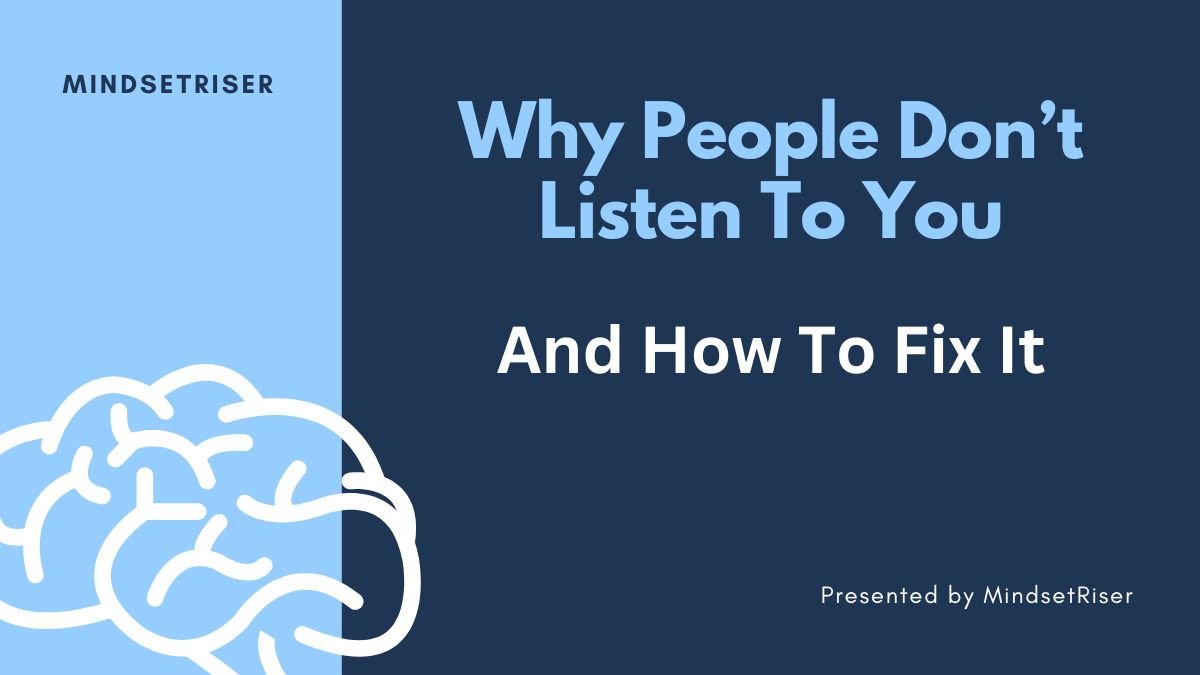Why People Don’t Listen to You (And How to Fix It)
Why People Don’t Listen to You (And How to Fix It)
Introduction
Have you ever felt like you’re talking, but no one is really listening? Whether it’s in personal relationships, at work, or in social settings, not being heard can be incredibly frustrating. If people constantly ignore or misunderstand you, it’s time to dig into the reasons why—and more importantly, how you can fix it.
This guide will explore why people don’t listen to you and provide practical solutions to make sure your words have impact.
Why People Don’t Listen to You
Before fixing the problem, you need to understand what’s causing it. Here are some of the most common reasons:
1. You Talk Too Much Without Listening
- Communication is a two-way street. If you dominate conversations, people may tune out.
- Fix It: Develop active listening skills. Ask questions and genuinely listen to responses before sharing your thoughts.
2. Your Tone or Delivery Is Off
- If you come across as aggressive, condescending, or monotonous, people may ignore you.
- Fix It: Work on your tone and body language. Use a confident but inviting tone to engage listeners.
3. You Don’t Communicate Clearly
- Using vague language or rambling makes it hard for people to follow your message.
- Fix It: Be direct and structured. Get to the point quickly and avoid unnecessary details.
4. People Don’t Find Your Words Valuable
- If your words lack relevance or credibility, people may dismiss them.
- Fix It: Speak on topics that matter to your audience. Provide insights, facts, or personal experiences to make your words meaningful.
5. You Lack Confidence
- If you seem unsure about what you’re saying, others won’t take you seriously.
- Fix It: Maintain eye contact, use strong body language, and avoid filler words like “um” and “uh.”
6. You Interrupt Too Often
- Constantly cutting people off makes them feel disrespected, leading them to ignore you.
- Fix It: Let others finish their thoughts before responding. Practice patience in conversations.
7. You Don’t Adapt to Different Audiences
- The way you communicate with friends shouldn’t be the same as with colleagues or clients.
- Fix It: Adjust your communication style based on who you’re speaking to. Match their level of formality and language preferences.
8. Your Nonverbal Cues Send the Wrong Message
- Poor eye contact, slouching, or distracting gestures can make people disengage.
- Fix It: Use open body language, maintain eye contact, and show enthusiasm through gestures.
9. You’re Too Negative or Critical
- Constant complaining or criticism makes people avoid conversations with you.
- Fix It: Focus on constructive discussions and solutions instead of just pointing out problems.
10. You Don’t Show Interest in Others
- If you only talk about yourself, people may lose interest.
- Fix It: Show genuine curiosity about others. Ask engaging questions and make conversations balanced.
How to Make People Listen to You
Now that you know why people may not be listening, here’s how you can gain their attention and respect:
1. Be an Active Listener First
- Show you care about what others are saying before expecting them to listen to you.
- Use verbal affirmations like “I see what you mean” and nonverbal cues like nodding.
2. Speak with Confidence
- Stand tall, project your voice, and avoid hesitations.
- If necessary, practice public speaking or take a communication course.
3. Make Your Message Clear and Concise
- Organize your thoughts before speaking.
- Use short, impactful sentences that get to the point quickly.
4. Use Stories and Examples
- People remember stories better than facts.
- Relate personal experiences to make your message more relatable and engaging.
5. Engage with Eye Contact and Body Language
- Eye contact builds trust and keeps people focused.
- Avoid crossing your arms, as it can signal defensiveness.
6. Adapt Your Tone to the Situation
- Use a friendly, authoritative, or empathetic tone depending on the context.
7. Give Others a Chance to Speak
- Conversations should be a dialogue, not a monologue.
- Ask open-ended questions to encourage engagement.
8. Be Mindful of Your Audience
- Tailor your message based on who you’re speaking to.
- Consider cultural or generational differences in communication styles.
9. Use Humor and Positivity
- People enjoy listening to those who make them feel good.
- A well-placed joke or positive remark can make you more approachable.
10. Follow Up and Show Appreciation
- If someone listens to you, acknowledge it.
- A simple “Thanks for hearing me out” can strengthen connections.
Conclusion
If people don’t listen to you, it’s not necessarily their fault—it could be due to the way you communicate. By refining your approach, being an active listener, and ensuring your message is clear and engaging, you can make people pay attention.
Remember, effective communication isn’t just about talking—it’s about connecting. Start practicing these strategies today, and you’ll notice a difference in how people respond to you.
Key Takeaways
✅ People ignore you when you talk too much, lack confidence, or fail to engage them. ✅ Clear communication, confidence, and active listening make a huge difference. ✅ Adapt your tone, body language, and message to your audience. ✅ Make conversations interactive—listen, ask questions, and show interest in others. ✅ Improve your speaking skills to command attention and respect.

